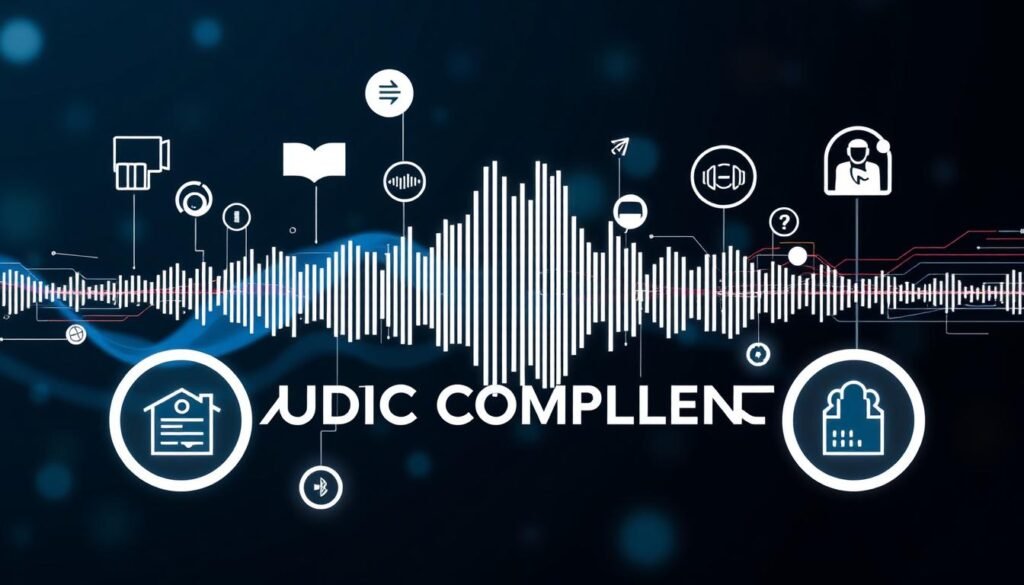In the world of SEO, it’s super important to know about audio penalties. These are bad news for websites that don’t follow Google’s rules on audio. Now, more people are listening to audio content. If you break the rules, your website might not be seen by many. We must know how Google checks audio and what breaks the rules. This way, your website can stay in the game.
Key Takeaways
- Understanding audiopentalty is vital for maintaining search engine visibility.
- Audio penalties can severely impact website traffic and rankings.
- Google monitors audio compliance strictly to uphold content quality.
- Non-compliance can result in considerable audio violation consequences.
- Best practices are essential to avoid penalties related to audio content.
The Concept of Audio Penalty in SEO
Audio penalties are key for better website visibility. Google gives these penalties if your website doesn’t follow audio rules. These rules ensure your audio is high-quality and accessible to everyone.
Defining Audio Penalty
Google sets standards for website audio. Not meeting these can lead to penalties. You might get penalized for poor audio, not having transcriptions, or irrelevant audio.
- Low-quality audio production
- Failure to provide accurate transcriptions for accessibility
- Use of audio files that are not relevant or valuable to users
This means you must make your audio engaging and well-made. This way, you stay strong in search results.
How Google Monitors Audio Content
Google uses special algorithms for checking audio. These look at:
- Relevance of audio content to the website’s topic
- Quality and uniqueness of the audio
- Accessibility options, such as transcripts, to assist users with disabilities
Make sure your audio follows Google’s rules. If not, your website won’t show up well in searches. This hurts your site’s traffic and how users interact with it.
Understanding Audiopentalty and Its Consequences
Knowing about audiopentalty is important for a good online image. Various factors can cause it. These factors can get your site in trouble for breaking audio rules. Learning these triggers helps site owners avoid problems and follow Google’s rules.
What Triggers Audiopentalty?
Many things can cause audiopentalty, hurting your site’s reputation. Among these are:
- Irrelevant Audio: Audio not matching your content can confuse people and cause trouble.
- Lack of Quality Content: Low-quality or unoriginal audio can break Google’s rules.
- Non-compliance with Accessibility Standards: Not offering transcripts or captions can lead to issues if your audio isn’t open to everyone.
- Thin or Shallow Audio Content: Audio that doesn’t have much info or relevance can lead to audiopentalty.
Consequences of Audio Violations on Rankings
The penalties for audio mistakes can vary, but they often include:
- Reduced Visibility: Sites that break audio rules might not show up much in search results.
- Lower Organic Traffic: Google might lower your site’s ranking, making less people visit naturally.
- Long-term Trust Issues: If you keep breaking the rules, it could harm your site’s reputation for a long time.
It’s key for internet marketers and content makers to think about these issues. By using good and relevant audio that follows the rules, you can avoid penalties. This helps your SEO and keeps your site doing well.
| Trigger Factors | Potential Consequences |
|---|---|
| Irrelevant Audio | Reduced visibility in search results |
| Lack of Quality Content | Lower organic traffic |
| Non-compliance with Accessibility Standards | Long-term trust issues |
| Thin or Shallow Audio Content | Decreased website ranking |
Types of Audio Penalties and Their Impact
It’s important for website owners to know about audio penalties. Penalties can come from algorithms or people. Knowing these helps you avoid problems.
Different Forms of Audio Penalties
Audio penalties happen for many reasons. Here are some:
- Unnatural Links: Some websites get penalized for fake links. These might be links they bought.
- Unnatural Outbound Links: If a site buys links out, they could get in trouble.
- Hacked Website: A hacked site with bad content can get big penalties.
- Thin Content: Sites with not helpful content risk getting penalties.
- Pure Spam: Using tricks to rank higher can lead to penalties. This is because they don’t help users.
- User-Generated Spam: Sites with spammy comments or posts can be penalized too.
- Keyword Stuffing: Using too many keywords can attract penalties today.
- Hidden Text: Hiding text, like making it the same color as the background, can be bad.
Impact of Sound Fines on Website Visibility
Sound fines can really hurt a website. They can make your site hard to find and hurt its performance. This means:
- Decreased Rankings: Websites might go down in rankings. This makes it hard for people to find them.
- Loss of Traffic: With lower rankings, fewer people visit the site. This can affect how much money it makes.
- Diminished Authority: Breaking audio content rules can make a site less trusted. This hurts its reputation.
Regulations and Best Practices to Avoid Audio Penalties
Following rules for audio penalties is very important. It keeps your website trusted and seen. These rules protect your site and make it nicer for visitors. Here are critical tips and ways to stay away from audio troubles.
Guidelines for Audio Content Compliance
- Create new and great audio content. Google likes unique and interesting stuff.
- Make correct write-ups of your audio. This helps search engines find your content better.
- Make sure everyone, including people with disabilities, can use your audio stuff. This makes your content easier to understand and follow the rules.
- Check your content often for quality and how relevant it is. This lowers rule-breaking risks.
Key Strategies to Prevent Audio Violation Consequences
Using smart plans can really help avoid problems with audio penalties:
- Remove spammy comments and bad user stuff to avoid trouble.
- Stay away from too many keywords which can drop content quality and search ranking.
- Keep your website safe from hackers that bring bad content.
- Always check the links inside and outside your site to make sure they’re good and fit the topic. This helps follow audio rules.
By using these tips and plans to dodge audio issues, site owners can lower risks. And they can make their website valuable for everyone.

Conclusion
It’s key to know about audiopentalty for a strong website in search results. The impact of audio penalties on SEO is big if you don’t follow guidelines for audio. Not following Google can lead to big issues. This can make your site less visible.
To avoid penalties, make great content and follow Google’s rules. Focusing on good, not just more, content helps avoid risks. Risks like poor content, hidden text, and spam. These can hurt your site’s rank.
The digital world is always changing. Knowing how audio affects SEO is key to doing well. Understanding audiopentalty helps your site do well among others. It’s all about staying within rules to succeed.
